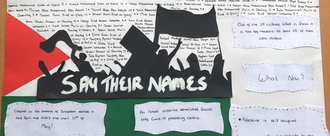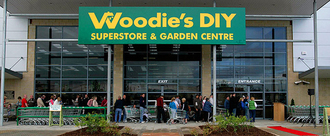- Featured
- Animal Rights
- Anti-racism
- Arts & Culture
- Children
- Climate
- Corporate accountability
- Crime
- Disability rights
- Economic
- Education
- Environment
- Food and Sustainable Production
- Gender Equality
- Governance and Transparency
- Health
- Housing
- LGBT Rights
- Mental health
- Northern Ireland
- Planning
- Privacy and Data Protection
- Rural Inequality
- Social Justice
- Trade
- Transport and Infrastructure
- Workers' Rights
- More
-
Hold Gardai Accountable For Ignoring Domestic Violence VictimsMaking that call is often the first step on a victims journey to safety. It can take to 35 assaults before a victim reaches out for help. Ignoring calls leaving women and children to fend for themselves is unacceptable.160 of 200 SignaturesCreated by Mary-Louise Lynch

-
Stop The ShopResidents in the Callenders Mill estate and surrounding estates do not want a shop built on the green area in front of their houses. This green is filled with children playing every day. Residents want to keep this green space as there is already a lack of green spaces for children in Celbridge. Callenders Mill is clearly a residential area. The proposed shop will be open from 7am to 10pm, which will cause serious disturbance and noise pollution for residents. There is already insufficient parking for residents in the estate. There are already a significant number of other shop in the vicinity. There are also vacant shop units within walking distance of the proposed site. We do not need or want a shop in Callenders Mill, Celbridge!249 of 300 SignaturesCreated by Joanne McGarry
-
Fairness and equality for unmarried familiesHaving recently lost my partner of near twenty years and being left to be the sole provider of our three children I have discovered that I am not entitled to the same supports as my married counterparts. Unmarried families are not recognized under our constitution and are therefore not offered the same protection from the state. The state treats cohabiting couples as a family unit for taxation and means testing purposes yet it will not accept cohabitation when there is a bereavement. Modern society does not allow for people to live the way they did when the constitution was written due to the challenges people have to face both financially and personally. I am calling on the Government to address the definition of the Family where marriage is concerned and also to address the families that have been left out of the widow/widower pension due to there status not being accepted by the state.2,446 of 3,000 SignaturesCreated by John O meara
-
Stop the Breaching of Children's Rights in Palestine“If there is a hell on earth it is the life of a child in Gaza” - UN Secretary General Antonio Guterres. We, young people of Cork, call on everyone to sign our petition for an immediate end to the attacks on the past, present, and futures of Palestinian children. If it is "hell on earth" why have the constant attacks not stopped? Why have these children not been saved? Why has the destruction of the Palestinian people, culture, and way of life been allowed to continue? We call upon the international community to recognise the consistent breach of the Geneva Convention and the UNCRC and to take steps to ensure such breaches are not repeated. As youths, we ourselves understand the need for care, safety, and security throughout childhood. We understand the damage that a lack of such can do to those who would otherwise flourish in a safe and healthy environment. How can we stand aside while this is being denied to children like ourselves in Palestine? “That which you don’t condemn, you condone”149 of 200 SignaturesCreated by Cork Life Centre
-
Remove restrictions on Birth Partners in Northern IrelandBirth partners are not visitors; they often are the other parent to the baby/babies and provide essential physical, mental and emotional support during pregnancy and birth. While pregnancy is not an illness, pregnant people are particularly vulnerable emotionally and mentally, and having to attend appointments without the support of a trusted partner can leave them feeling alone, scared and anxious. This can lead to mental health issues. Prior to the pandemic, one-third of women found their birth experience traumatic, which can significantly affect their lives, their relationships and their transition to parenthood; restrictions are compounding this. Birthing people and their partners should be treated in an holistic way, protecting their physical, emotional and mental health.714 of 800 SignaturesCreated by Mothers Matter NI
-
Referendum on HousingA Referendum is essential:- 1. To deliver affordable homes for citizens by outlawing the artificial 37% added costs to build homes in Ireland. VAT alone is €23,000 for a 3 bed semi. 2. To stop Rack Rents preventing young people from saving for their own homes and preventing lower income groups from access to 3rd level education due to the exorbitant cost of student accommodation. 3. To prevent Evictions unless decided by the Courts. ... and ... to remove the Central Bank biased and unfair constraints on Irish citizens which are not applicable to foreign vulture funds or local councils competing for homes. - to stop Vulture funds competing with first time buyers. - to stop Local Authorities competing with first time buyers. - to stop recurring Housing crises. "The 2008 CRASH could not have happened if this Referendum had been passed when called for in 1974. It was again recommended in 2014 by the Constitutional Convention." - to reduce the cost of build - artificially inflated by 37%. - to reduce the funding requirements for small and SME builders to build houses - increasing competition. - to increase competition in the housing supply. - to deliver proportionate amount of social homes.113 of 200 SignaturesCreated by R Neuville
-
Hot Lunches for Knockmore Junior School TallaghtChildren sharing the same campus and buildings will have different meals. Junior school children will have a cold lunch while children in the adjoining senior school, along with all other children in the parish, will have a hot lunch. Killinarden is a area of social and economic deprivation. A hot school meal is essential for the development of the child and their full engagement in education.492 of 500 SignaturesCreated by Dearbhla Byrne
-
Ban the practice of conversion therapy on the island of Ireland!Conversion therapy is an inhumane practice, based on the belief that being gay or transgender is something that can ‘be cured’. Since we launched, survivors have been sharing their stories of suffering at the hands of conversion therapy and the adverse effect it has had on them. This is still going on, it is still ruining lives. It has to stop. Members of the LGBTQ+ community have suffered trauma and developed serious mental health problems as a result of experiences of conversion therapy, and some have taken their lives as a result of their experiences. This is a tragedy. We in the ACTC want to ensure that conversion therapy, both in the Republic of Ireland and in Northern Ireland, is relegated to history. We hope that you can sign our petition today as a showing of support for all those in the LGBTQ+ community, and all of those who are no longer with us as a result of conversion therapy. Your signature will send a clear message to our politicians that we want to see this reprehensible practice outlawed without exception. Go raibh míle maith agaibh. Thank you all very much. Anti Conversion Therapy Coalition. Twitter- @antictcoalition Facebook- Anti Conversion Therapy Coalition Instagram- @antictcoalition Email- [email protected]21,069 of 25,000 SignaturesCreated by Anti Conversion Therapy Coalition
-
Woodies, Replace RoundUp with Wildflower seeds!We're in a biodiversity crisis, and it's vital that we stop spraying chemicals that kill our bees and other pollinators. You have the power to influence customers to make better decisions and have beautiful gardens where biodiversity can thrive.105 of 200 SignaturesCreated by Emily Duffy

-
4 MORE BIRTHDAYS...END DIRECTION PROVISION NOWThe government plans to continue with direct provision in existence until the end of 2024. The government has not committed to ending the delays in the international protection process, that greatly exacerbate the impacts of the direct provision system. This failure has severe impacts on people's mental health and ability to integrate in the community. In order to address this ongoing harm, the government must identify suitable alternative modes of accommodation immediately and introduce new modes of accommodation in 2021. Further priorities that government needs to act on right now are identified in the Catherine Day Report (page 83). These actions can and should be done immediately. 1. Carry out vulnerability assessments for all people in the international protection process to identify and accommodate their special reception needs. A pilot program has commenced, but this will need to be heavily resourced to ensure that all people can be assessed, as Ireland has been obliged to do since 2018. 2. The allowances currently paid to people in direct provision should be increased from January 2021 and regularly reviewed in line with the cost of living. (4.12) – This has not been done. 3. The right to work should be made available after 3 months. (5.1) – This has been reduced to 6 months, not 3 months. It should be reduced to 3 months or 0 months without delay. 4. Applicants should be entitled to apply for driving tests and licenses as soon as they have made an application for protection. (5.2) - This has not been done yet. Government has committed to implementing this by summer 2021 in the White Paper. 5. Applicants should have the right to access higher education on the same basis and at the same fees as Irish people, once they meet the qualifying criteria (5.5). Access to education has been expanded but not to this extent; education is a human right, delay is not acceptable. 6. To clear the backlog of current cases a one-off case-processing approach should be introduced for all applications which have been more than two years in the system (6.7). This has not been done and there has been no commitment by the Department of Justice to do so. This priority – the case processing system – is a crucial action that needs immediate implementation by the Department of Justice. The delays in the international protection process have worsened due to the impact of Covid-19, because international protection interviews and Tribunals were paused for many months. People have been left waiting sometimes for over one year for a decision even after their interview. This has a negative effect on people's mental health, ability to integrate in the community and delays the possibility of their family members joining them. As well as the once-off case processing approach for all applications which have been more than two years in the system, the government must act to ensure that interviews take place and decisions issue within specific lengths of time. The Minister for Justice must ensure that the International Protection Office has the resources, staff IT equipment to deliver this even in challenging situations such as Covid-19. Minister Roderic O’ Gorman has called the timeline of the end of 2024 ambitious. Calling this ambitious is a disgrace. We know that our government can act quickly in the common interest when it has needed to since the start of COVID-19. We’ve had 21 years of people in Ireland living in direct provision and the harm that this does to people and to our communities. The government must act now identify suitable alternative modes of accommodation immediately, while also taking immediate actions to fully implement the priorities identified in the Catherine Day Report, and introduce new modes of accommodation in 2021.128 of 200 SignaturesCreated by CETSS Against Racism
-
Equality for Children NOW!Last week, the Irish Government published a report on children’s rights and best interests in the context of assisted human reproduction, written by the Special Rapporteur for Child Protection, Professor Conor O’ Mahony. If adopted, the recommendations contained in this report would address numerous legislative gaps that prevent children conceived through AHR, from having a legal parent-child relationship with both the parents, who love and care for them on a daily basis. Equality for Children are calling on the Government and Minister for Health, Stephen Donnelly to immediately adopt and implement the recommendations made in this report. We urge you to sign our petition in order to push the Irish government to take the actions our children need! More information about the report: The report by Professor O’Mahony provides clear, practical solutions, which uphold the rights and best interests of children including their right to family life, identity and non-discrimination. The report recognises the reality of AHR treatment, which can often involve needing to access services abroad. The report also highlights the need for legislation to address the real-life circumstances of individual children including those already born, so they can establish a legal parental relationship to the parents who love and care for them daily. It highlights the need to provide comprehensive legislation to cover areas such as; altruistic surrogacy in Ireland, the recognition of the rights of children born through international surrogacy, and crucially addressing the gaps in both the Children and Family Relationships Act 2015 and the drafted Assisted Human Reproduction Bill by including children already born through surrogacy, children conceived using a known donor and children conceived outside of clinical settings. The report acknowledges the distress caused to children born through assisted human reproduction and their families due to the absence of appropriate legislation “Children have been left in vulnerable legal positions for lengthy periods of time due to the failure of the Oireachtas to legislate to address their status.” Ranae von Meding, CEO of Equality for Children says, “Last week’s launch represents another crucial step forward in our campaign. By adopting all of the recommendations in Professor O’ Mahony’s report, thousands of children in Ireland will finally be able to have a legal parent-child relationship with both of their parents, something that has been denied to them to date. This includes children born to gay dads through surrogacy, children conceived using known donors and those conceived outside of clinical settings left behind in the Children and Family Relationships Act, 2015”. “Significantly, the report recognises the uneven impact the CFRA has had on children conceived outside of clinical settings and born to LGBT+ parents who cannot rely on the presumption of paternity/maternity as male-female couples can. This very principle has been a significant pillar of our campaign at Equality for Children, as it has effectively resulted in children of LGBT+ parents being discriminated against based on the sexual orientation of their parents.” “We urge the Government to act swiftly and adopt all of these recommendations into legislation governing assisted human reproduction. It is almost 6 years since our country voted for marriage equality. We are still waiting for the legislation that will allow the children of LGBT+ parents to be treated equally." “As it stands currently , in the vast majority of LGBT+ families, only one parent can be a legal parent. This must change. It’s not equal and it’s not what we voted for.”15,610 of 20,000 SignaturesCreated by Ranae von Meding
-
Investigate Data Collection on Autistic PeopleThe rights of autistic people have been gravely breached. The Department of Education and the Department of Health have conspired to share and indulge in private information of 48 autistic people in order to create barriers for them to obtain essential services. This stands in clear violation with our rights under the UNCRPD or the protection of those seeking justice under the Equal Status Act, 2000.3,278 of 4,000 SignaturesCreated by Autistic Adults Ireland











.png)
